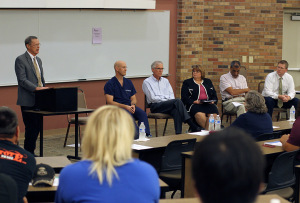
Days after the first outbreak of the Ebola virus in the United States, Scott Hoyer, chief medical officer at United Regional Hospital, and Keith Williamson, medical director at Vinson Health Center, said students and residents of Wichita Falls are at a low risk of getting the Ebola Virus Disease.
“I don’t think we are at a high risk because people can go to Dallas and come into contact with the body fluid of a person with the disease or symptoms of the disease. I don’t think we can say Wichita Falls is at a higher risk than any other place,”Hoyer said. “We live in a society where people move about very easily. I don’t think because we live two hours away from Dallas puts us at any greater risk”
Williamson sent a note on Oct. 3 stating, “Wichita Falls is far removed from the index of case of Ebola virus disease in Dallas,” Williamson said in the email to the campus. “We are more than 100 miles in distance. We don’t have an international airport like Dallas Forth Worth. This is a virus that is transmitted by direct contact with body fluids primarily. So simply being more than three feet away from a person who has the disease is going to be protective for most people.”
The virus can only be transmitted from close bodily contact and the sharing of body fluid.
Hoyer said, “Body Fluid can be saliva, semen, urine, feces, blood, secretion from the nose, sweat, and vomit. Basically any kind of fluid that comes from the body.”
Hoyer said the disease is not an airborne one and is not transmittable unless the person starts to show symptoms.
AREA PREPAREDNESS
While United Regional Hospital officials said they are adequately prepared in the event of an Ebola outbreak in the community, the Vinson health Center medical director said they are not.
“I don’t think Vinson Health Center is adequately or completely prepared for the Ebola. Even the Texas Health Presbyterian emergency room was not completely prepared,” Williamson said. “We are as prepared and as rationale about it as we can be in this environment. For that sake, if someone is arm amputated, or has a heart attack, I can’t handle it here. I don’t even deliver babies here. I could, piece of cake, because I did it years ago, but we don’t do that here.”
In contrast, there are plans at Vinson Health Center if a student shows up claiming to have a high fever, shaking chills, abnormal pain and headache, or they were in an Ebola area within 14 days.
“The Vinson Health Center plan is to take that individual into a room that is already designated. We are not going to use this room for anything else but suspicious Ebola disease. After we place them in that room, the nurses and I will put on protective equipment and we will then assess the history in more detail and proceed to examine as much as we need to and then lock down the lobby and no one leaves. If it is still suggestive, I will call United Regional Hospital and let them know, I got one and this one needs to be hospitalized,” Williamson said.
However, Hoyer said United Regional Hospital has became a lot more prepared in the last two weeks.
“We are responding everyday to the new things we have been hearing for the last two weeks. The hospital has been working very hard to be doubly prepared. By that I mean, the hospital has been prepared to deal with contagious diseases for a long time now. Our nurses know how to do it. Our doctors know how to do it,” Hoyer said. “We know how to isolate patients, but the Ebola virus required a little more isolation. That is what the hospital has been focusing on is teaching and training our staff, particularly the staff that will be caring for an Ebola patient.”
Hoyer said another thing the hospital has been prepared for is to recognize the disease when patients show up at the hospital that might have the symptoms and can differentiate the patients from others.
Hoyer said there are two important questions he can use to differentiate Ebola from other common illnesses.
- Have you traveled to West Africa in the last 21 days?
- Have you been exposed to someone who traveled to West Africa in the last 21 days who has symptoms?

The 21 days are important because if it has been longer than 21 days, the patient cannot have the virus because they would have manifested the disease, said Hoyer.
Meanwhile, the Wichita Falls Health District’s director of health, Lou Kreidler, said it would be very unlikely for someone to show up at WFHD.
Kreidler said, “We are not a primary health care facility. We have a special clinic that is. If someone shows up STD, STI, TB, HIV prevention or immunization we can deal with that. We are not a sick clinic, so people generally don’t walk in with a fever.”
Just as the clinic would refer people presenting Ebola-like symptoms to the proper facility, so would officials at local airport.
There are no additional security measures at Wichita Falls Municipal Airport. The CDC has put measures in place for those persons leaving from Sierra-Leone, Guinea and Liberia. Also persons flying out of those Ebola-restricted areas have their temperatures taken at major airports in the United States including John F. Kennedy, Newark Liberty, Chicago O’Hare, Atlanta Hartsfield and Dallas-Forth Worth International Airport.
Kreifler said, “There is no protocol in place for Wichita Falls Municipal Airport due to recommendation from the CDC.”
DON’T PANIC
Williamson said he wants the students to be informed about the disease and advises students traveling to West Africa, or traveling in general during the Christmas holiday, to take preventative measures.
“I want the student body to be sensitized about the Ebola virus, but don’t panic because panicking would increase your risk of getting the Ebola, Williamson said. “People tend not to behave rationally when they panic. This is primarily a disease for health care workers. I am at risk more than anybody on campus because we are the first contact and, we do very close physical contact with the patients we take care of. In Dallas two nurses got sick. I don’t think the student body has much to worry about as long as they don’t take upon themselves that role of rescuer. If somebody falls over and starts throwing up blood, call an ambulance and don’t rush in on the person or try to assist that person.”
Williamson said he also would advise students to regularly use hand sanitizer and keep their hands away from their mouth. The same things can protect someone from the flu so he also advised students to make appointments to take the flu shots so physicians don’t get the symptoms confused.
PENINAH MACHAGA
Peninah Machaga, a graduate student in marketing from Kenya said, “For me, it is scary. I had the experience living in Uganda, where there was Ebola in 2008. It was a scary experience to see so many people die and to see they had been quarantined. It was scary. When I was moving around, I had to wear a mask. I had wear to gloves. I could not greet anyone, and I could not eat because I was so scared to eat. The information was not available how the disease was contaminated. So for me, it was a scary experience.“
“Currently, what I am doing is, I am not greeting anyone with my hands. I am not hugging anyone. Every time I go out, I am sanitizing my hands when I come into contact with someone,” said, Machaga.
Machaga said she has intentions of traveling to Africa in December for vacation however, she is not from a country where the Ebola is prevalent. Machaga said, “Kenya is in East Africa while Liberia is in West Africa. I am going, but I am still scared because I am not sure if someone with Ebola is on the plane. So there is a high chance of getting it so I am 50-50 at the moment.”
HAJA SAHONEH
Another student who will be traveling home in December said hearing about the disease is scary, but they will take preventive measures on the plane, airport and when they get back to Africa.
Haja Sahoneh, junior nursing said, “I fear for myself and I am fear for other people, because the way it is transmitted, it is not easy to compare to other viruses. It’s more dangerous and scarier. I would say people that live around that area like Liberia and other countries where Ebola is at, I feel like no one will be safe because you don’t know who has it, like how to identify the symptoms . The CDC said it takes 21 days.”
“I do not have the equipment to check to see if that person has a high fever. It could be that the person has a normal headache and this is scary for me,” said Sahoneh.
Sahoneh said “Right now since Dallas has it, I am not safe but I am trying my best to wash my hands often and be careful of the people I meet. I am in Wichita Falls so I would not say I am 100% safe because people go and come from Dallas. I think everyone should take care of themselves to prevent the spread of this virus. The more we protect ourselves, the less likely the disease spread. I will never isolate anyone “
The Ebola virus disease is a serious and deadly. It can be transmitted by animals and humans. This virus belongs to a viral family called Filoviridae. The Ebola disease causes hemorrhagic fever or profuse bleeding inside and outside the body accompanied by a very high fever.
To date, the total number of deaths is more than 4,500 with more than 9,200 infected.
READ MORE: More than 120 attend community meeting on Ebola
READ MORE: Compare and contrast Ebola and the flu
















